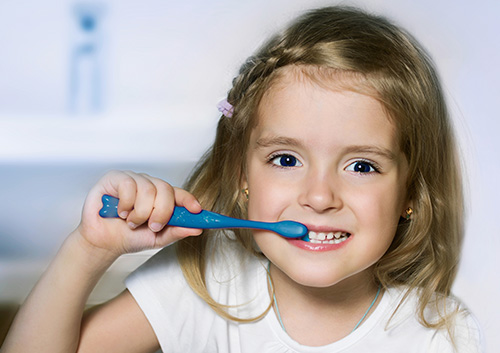September 20th, 2023

The short answer to this question? Yes. Because your child’s breath is a reflection of his or her oral health, you should talk to Drs. Joanne Oppenheim, Marilia Montero, and Mary J. Hayes if you notice any unpleasant changes. While better dental hygiene is usually the answer for young children, bad breath can also be a symptom of more serious problems.
Oral Hygiene
Most often, bad breath is simply a sign that your child needs a little help developing proper brushing and flossing habits.
- Show your child how to use a soft-bristled brush that fits in the mouth comfortably, be sure to brush all the surfaces of each tooth, and don’t forget to angle toward the gum line. And brush long enough. Once all the baby teeth have arrived, two minutes of brushing is usually recommended for children.
- It’s not too early to floss! Adults need to handle the flossing duties for children until they can manage on their own, so it’s a perfect time to teach technique. And, just like toothbrushes, floss should be flexible and soft.
- Don’t forget the tongue. Our tongues harbor the bacteria that cause bad breath, so finish off your child’s routine with a gentle brush of the tongue.
Better oral habits mean not only fresh breath, but give those baby teeth the best chance of staying healthy until they are naturally replaced by adult teeth. After all, baby teeth not only help your child learn to eat and speak properly, but they act as necessary placeholders so the permanent teeth are able to erupt in exactly the right spot.
Talk to a member of our Chicago office team at your child’s next appointment if you are concerned about oral hygiene–they have many great suggestions for making brushing and flossing more efficient, comfortable, and even fun for your child.
September 13th, 2023

Unfortunately, dental emergencies can sometimes be unavoidable among young children. The good news is Drs. Joanne Oppenheim, Marilia Montero, and Mary J. Hayes can help you prepare in case you and your child find yourselves in any of the following situations.
Teething
Starting at about four months and lasting up to three years, your son or daughter may experience teething pain. It’s common for teething children to grow irritable and become prone to drooling due to tender gums. Give your child a cold teething ring or rub his or her gums with your finger to help relieve the discomfort.
Loss of Teeth
If a baby tooth is knocked out in an accident, bring your child to our Chicago office to make sure damage hasn’t occurred in the mouth. Permanent teeth can sometimes grow in before baby teeth have fallen out. In this situation, Drs. Joanne Oppenheim, Marilia Montero, and Mary J. Hayes should examine your child to make sure teeth are growing in properly. This can prevent serious issues from arising later in adulthood.
Gum Issues
Bleeding gums could mean several things. They may be an early sign of periodontal disease, which results from poor oral hygiene. Gums may also bleed if a youngster is brushing too hard or has suffered an injury to the gum tissue.
Rinse your child’s mouth with warm salt water and apply pressure to the area if bleeding continues. Don’t hesitate to contact our Chicago office if you are concerned so we can schedule an appointment.
As a parent, you can provide the best education for your children on proper oral hygiene habits. If you some coaching, ask Drs. Joanne Oppenheim, Marilia Montero, and Mary J. Hayes for tips during your next appointment.
September 7th, 2023

It’s a busy time of year. Book lists! Supplies! New clothes! (How did they outgrow those shoes already?) And while you’re preparing your family’s list of back-to-school necessities, here are a few essential reminders to help your child begin the school year with a healthy smile.
It never hurts to review the basics before the start of the school year, and that holds true for dental care as well! Make sure your child is brushing two minutes twice a day, and using floss or another interdental tool to clean between the teeth. If his toothbrush has been in use since the end of the last school year, it’s probably time to replace it. Bristles are at their best for about three months—after that, they become frayed and worn, and can’t remove plaque as effectively.
- School Supplies for Braces Wearers
If your child is going to school with braces for the first time, send her off with the tools she needs. A travel-sized toothbrush and tube of toothpaste are perfect for a quick brushing after lunch, while dental floss and a threader or dental picks will take care of any after-lunch particles lurking in brackets and wires. Orthodontic wax is a great product to have on hand if a wire or bracket is causing irritation. If your child uses clear aligners or a retainer, make sure a protective case is always close by, ready to use every time the appliance is removed. And it’s a good idea to include the number of your dentist and orthodontist in her contacts in case of emergency.
If your school requires a dental exam before the start of classes, be sure to make your appointment at our Chicago office now! Regular checkups with Drs. Joanne Oppenheim, Marilia Montero, and Mary J. Hayes are vital for preventing small problems from becoming bigger ones, and a professional cleaning will remove the plaque even careful brushing can miss.
A positive, confident start can set the tone for the academic year, so your homework might include monitoring summer reading, providing required supplies, and making sure your child is well-rested and ready to go. You can also help your child to a positive, confident start by monitoring brushing habits, providing the necessary tools for appliance-wearers, and making sure your child is up-to-date with dental exams and cleanings. Because entering the classroom with a beaming, healthy smile—that’s an A+ way to begin the school year!
August 30th, 2023

First word, first step, first haircut, first… toothbrush? While it may not be considered a typical milestone, choosing the right first toothbrush is an important first step in your child’s future dental health.
The time to start brushing is when your baby’s first tooth appears. Until then, you have probably been using a clean, moist washcloth or gauze to carefully wipe your baby’s gums. Continue that gentle treatment with a toothbrush designed for infants. Look for a toothbrush designed especially for infants and toddlers, with extra-soft bristles and a small head for tiny mouths.
When your toddler is ready to try brushing for the first time, there are many options to make learning the proper technique enjoyable for both of you! Extra-soft bristles and small brush heads again are important for young children, and brushes are available with colorful patterns and designs to charm any child. There are brushes available with handles designed for easy gripping, right-handed and left-handed options, and even electric models.
No matter which brush you choose, Drs. Joanne Oppenheim, Marilia Montero, and Mary J. Hayes and our team recommend:
- Use soft bristles and a brush head sized to fit your child
- Use the proper amount of toothpaste (when your child is old enough to spit out toothpaste instead of swallowing)
- Replace the toothbrush every three months, or earlier if it is frayed
- Always supervise your young child while he or she learns to brush
- Don’t forget to schedule checkups every six months at our Chicago office!
You probably won’t be preserving your baby’s first toothbrush in your baby book, but teaching your child the proper way to brush with the right toothbrush can lead to a lifetime of dental health. And that’s a milestone to celebrate!






